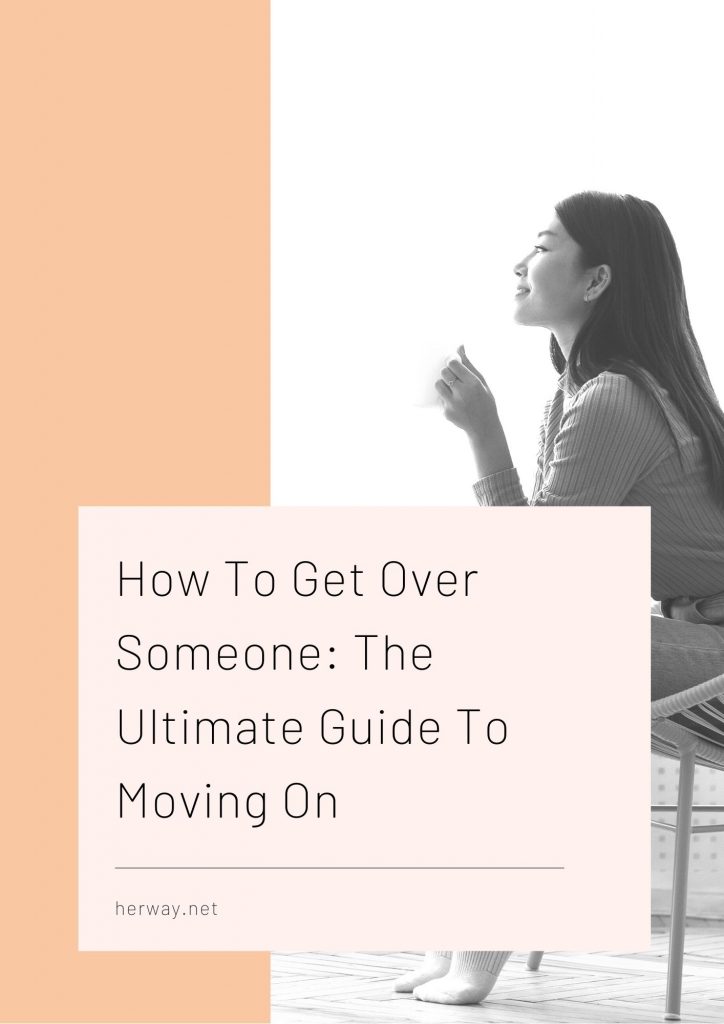Cómo olvidar a alguien: La guía definitiva para seguir adelante
Heartbreakla palabra que es lo contrario del amor y que puede cambiar tu vida en cuestión de segundos.
Al final de una relación con tu pareja, sólo puedes pensar en por qué y cómo.
¿Por qué tienes que pasar por estas bajas post-ruptura de un corazón roto, y cómo se puede superar a alguien que amabas tan profundamente?
Pronto te encuentras con un galón de helado mientras vuelves a ver tus programas de televisión favoritos y películas desgarradoras como El diario de Noa, con el fin de darte una sensación de comprensión y algún tipo de cierre sobre tu relación fallida.
En un momento del proceso de duelo, te encuentras pensando en lo que pasó en todas tus relaciones pasadas, acechar a tu ex en las redes sociales se convierte en tu principal pasatiempo y tu próxima relación es igual a misión imposible.

You simply can’t see the light at the end of the tunnel even if it would be illuminated by a fluorescent lamp.
(I hope I made you laugh even for a second because I know how hard it is to even think of moving your lips, let alone smile when you’re in that situation).
And that’s okay. It’s totally okay to feel like total crap, to cry out loud, and to curse your destiny because you’re only human after all.
It’s okay to let the negative emotions overwhelm you because you’re a human being made of flesh, emotions, passion and will.
It’s okay to feel hopeless about dejarse llevar porque es un proceso, y llevará mucho tiempo y paciencia hasta que algo cambie.
So, I will not tell you (like the majority of others) that you will get over someone if you strictly do this or that. No, things don’t work that way.
Cuando una relación termina, entras en el terreno de la incertidumbre, la decepción y la desesperanza, y todo esto forma parte del proceso de curación.
Hay que sentirla para curarla, porque la única salida es a través de ella.

Even though dwelling in pain and dealing with confusing emotions is the last thing you would want to do, it’s necessary because you need to go through it in order to delete it, destroy it—exterminate it.
The biggest mistake you could do is try to ignore all those painful emotions and pretend that you’re happy while literally dying from the inside.
You need to accept the fact that it’s okay to feel the way you’re feeling because breaking up with your loved one equals losing yourself, your sanity, and feeling like you’ll never be able to love again.
Romantic relationships end for various reasons, but you need to know that your life doesn’t end with them (even though it feels like the opposite), and all you need to do is give yourself a fair amount of time to grieve.
And if it feels impossible and you feel like you’re going to burst like a bubble from all the pain that has accumulated in your body and mind, then you know you’re not grieving the loss of your loved one, but you’re grieving the loss of an idea you had about your future life with your loved one.

It’s important to understand this one because it can significantly change your perspective on heartbreak and speed up the entire healing process.
At the end of the relationship, the entire sequence of possibilities and things that could have happened in the future ran through your head like a hurricane because now that you broke up, this sequence has disappeared into thin air, and you simply can’t accept it yet.
You can’t accept the fact that your life will change its course, and all the things you’ve imagined will never become a reality.
And that’s where you lose yourself. So, if you’re wondering how to get over someone you are in love with, the answer is in finding yourself again because that’s what you’ve lost in the first place.
Yes, you lost your ex-partner in crime, your lover, and probably a best friend all in one, but you also lost yourself because you’re no longer defined by your old relationship.
All of a sudden, you’re left on your own and that feeling of hopelessness is what terrifies you the most; that feeling of losing your identity and losing the sense of the future that you could have had together.

Another important thing to understand is that getting over someone is a process and not a destination. It’s a process that requires patience and some more patience (no matter how irritating this sounds to you).
And the sooner you start the healing process, the sooner you’ll start feeling better!
So, let’s not waste any more time, and instead, take a deep breath and dive decisively into the matter!
La guía definitiva consta de los aspectos cruciales para restaurar tu identidad, encontrar tu verdadero yo y centrarte en establecer una perspectiva positiva.
Algunos de estos aspectos son: el autocuidado, la aceptación, observar las cosas desde una perspectiva diferente, encontrar nuevas fuentes de significado, apreciar, etc., ¡y son de suma importancia cuando se trata del arte de seguir adelante!
1. Rodéate de personas que realmente se preocupen por ti

After a breakup, you enter a zone of negative emotions that can be really draining for your overall well-being. It’s because the only thing you can think of is them—your ex.
The only thing you’re focused on is thinking about why they’re no longer in your life and why things ended the way they ended.
You build walls around yourself and you don’t let anyone near them, not even your close people who were always there for you in good times and bad.
And that’s exactly what you need to do in order to gradually detach from that toxic zone of negative emotions.
Tienes que rodearte de personas que se preocupen de verdad por ti, porque así crearás una zona de emociones positivas que es crucial para el proceso de curación.
Spend time with your close friends and family. Contact that old friend you haven’t heard from for a long time now, and enjoy every second of reuniting and doing things you like.
2. Permítete sentir las emociones negativas

Aunque pasar tiempo con personas que realmente se preocupan por ti es el primer paso para curarte, permitirte sentir las emociones negativas también es uno de los pasos necesarios justo después de una ruptura.
Como ya se ha dicho anteriormente: Tienes que sentirlo para poder curarlo, ¡porque la única salida es a través de él! ¿Qué significa esto?
Significa que no debes reprimir tus sentimientos y emociones porque esto no te aportará nada bueno. De hecho, solo prolongará tu dolor y el proceso de curación.
Tienes que permitirte sentir las emociones negativas, llorar a gritos si es necesario, maldecir a todo y a todos y comer toneladas de patatas fritas o helado.
But, the only thing that you mustn’t do—no matter what—is suppress what you feel. Suppressing is like freezing yourself in the painful state that you’re in, and if you freeze it, you’ll stay forever like that.
You need to defrost yourself by allowing yourself to indulge in the spectrum of negative and painful emotions because that’s the only way to accept them and move on.
Véase también:8 señales de emociones reprimidas y formas de manejarlas con éxito
3. Analiza objetivamente cómo era realmente la relación y por qué terminó

After a relationship ends, it’s really hard to look at things objectively because you still think with your heart.
Tiendes a centrarte sólo en las cosas que fueron positivas, descuidando así todos los aspectos negativos de tu relación pasada.
This practice makes you stuck in a labyrinth of illusion where you’re convinced that things could have progressed differently even though deep down in your heart, you know that this is not true.
And when you’re convinced that things could have ended differently, you deliberately decide to keep dwelling in your pain and tormenting yourself over things you couldn’t or can’t control.
That’s why you need to take an objective look at what the relationship was really like.

Ask yourself whether you were genuinely happy in the relationship and how things changed—because they probably did given that you’re no longer together.
¿Usted o su pareja eran excesivamente celosos o han dañado de algún modo la confianza en su relación?
¿Dejasteis de esforzaros, de sorprenderos y de luchar por lo que teníais?
Una vez que te des cuenta de lo que realmente ocurrió y de por qué terminó tu relación, te resultará más fácil aceptar la ruptura y poner en práctica estas lecciones también en tus relaciones futuras.
4. Volver a conocerse a sí mismo

Cuando estás en una relación, literalmente pierdes algunas partes de ti mismo por la necesidad de comprometerte, de sacrificarte, etcétera.
Esto significa que te pierdes a ti mismo, y eso hace que el desamor aún más desgarrador e insoportable.
That’s why it’s important to get to know yourself again—to figure out who you really are, what you need, what are your passions, your purpose, and what makes you happy and fulfilled.
If you want to learn how to get over someone whom you loved deeply, you need to fall in love with yourself again, and the sooner you start working on it, the sooner you’ll start feeling better about the whole breakup thing.

Instead of wasting your time on overthinking, do things you love and you’re passionate about. Cook new meals, find a new hobby, learn to dance, sing or just go for a long walk.
Think about yourself before the relationship and what are the lessons that you’ve learned in the process. Think about what you really want in the future and how you want to feel.
You certainly don’t want to stay forever in this state of misery that you’re in at the moment, right?
Por eso, reconocerlo y desear sentirte feliz y despreocupado es el primer paso para sanar. Cuidarte es el primer paso para volver a conocerte.
Véase también: Esto es lo que significa realmente quererse a uno mismo
5. Hablarlo con alguien

If you’re feeling too overwhelmed while coping with your negative feelings on your own, another alternative would be talking it out with someone.
De hecho, deberías hacerlo aunque prefieras lidiar con tus emociones a solas. ¿Por qué?
Porque cuando hablas con alguien cara a cara, puedes expresarte más fácilmente y ver las cosas con más claridad.
Sometimes, all we need is someone to listen to us because by saying everything that’s on our hearts, we’re getting rid of the painful weight on our shoulders.
And we see things differently. When you’re thinking about something on your own in your own four walls, you risk entering the zone of overthinking which can cause real damage in the long run.
Pero, cuando compartes tus pensamientos con los demás, estos pensamientos se convierten en algo significativo.
Se organizan perfectamente, lo que facilita la comprensión de toda la situación.
6. Pon tus pensamientos y emociones por escrito

Otra alternativa a hablarlo con alguien es poner por escrito todos tus pensamientos y emociones en un entorno seguro.
This will give you a clear insight on how you really feel about the breakup, if there’s any progress, and what you should be doing differently.
Tal vez una idea aún mejor sea llevar un diario, porque te ayudará a seguir el progreso de tus sentimientos día a día.
Whenever you feel odd or feel like doing something that you shouldn’t (such as stalking your ex on social media or begging him to come back to you), just write it down in your journal, and you’ll feel much better.

Básicamente, escriba lo siguiente: I have the abnormal urge to call my ex and tell him some things so that he can see that we belong together, but I know that I shouldn’t be doing this because I need to detach from the breakup and spend time on my own or with my friends.
If I do it, I know that I will only prolong the pain that I’m feeling at the moment and that’s why I won’t do it. Period.
Whenever you have these urges to do something “out of the ordinary”, just write down the reasons why you want to do it and why you think you shouldn’t.
Luego léelo unas cuantas veces hasta que te haga efecto. Te prometo que te ayudará.
7. Salga de su zona de confort

Después de pasar unos días en la cama con litros de helado, programas de televisión y películas, caes en una rutina llamada inactividad.
Inactivity is the biggest enemy of the healing process, and that’s why you need to get out of your rut by getting out of your comfort zone.
Summarized, you need to do things that you don’t normally do and things that you’re, let’s say, passionate about.
This includes bungee jumping, going for a walk at 3 AM, acting like a complete fool on the street with your friends, wearing unconventional clothes, ordering something really creepy that you’d never normally eat, and similar.

Salir de la zona de confort también significa enfrentarse a los miedos, desafiarse a uno mismo y aceptar el hecho de que sólo se vive una vez, así que ¿por qué no disfrutar de la vida mientras se pueda?
¿Por qué perder el tiempo pensando en tu ex cuando podrías estar disfrutando de la vida al máximo?
Now, I know that this is easier said than done, but it’s true, and the sooner you accept it, the better.
8. Accept that loss is part of life and there was a reason why the relationship didn’t work out

You need to accept the fact that both loss and gain are inevitable parts of life, and there was a reason why the relationship didn’t work out.
Usually, the number one reason why a relationship ends is because you weren’t meant to be because if you were, you would still be together.
En lugar de culparte a ti mismo o a tu pareja, intenta dar las gracias por la ruptura (por muy raro que suene) porque Dios nunca te quita algo sin sustituirlo por algo mejor.

Just because your relationship failed, this doesn’t mean that your love life will be doomed eternally.
Again, there’s a reason why the relationship didn’t work out, and there’s no point in being in an unhappy relationship for the rest of your life, right?
By losing something toxic like a bad relationship, you’re opening doors to greatness in the future where you’ll finally be happy with someone with whom you’re meant to be!
9. Remember there isn’t just one person out there for you

When we fall in love with someone, we think that’s the only person for us, and we’re not interested in anyone else.
We forget the fact that there are billions of other people in the world, and there isn’t just one person out there for us.
Lo olvidamos porque nos enamoramos de sus peculiaridades y defectos, de su sonrisa, de su forma especial de hacer las cosas y de su personalidad única.

And, when we break up, we convince ourselves that we’ll never find another person like them with their characteristics.
Pero, ¿y si conociéramos a alguien que fuera aún más especial a su manera que la persona con la que rompimos?
Nunca pensamos en el hecho de que volvernos a enamorar no tiene nada que ver con encontrar a alguien idéntico o parecido a nuestro ex, sino que ocurre de forma natural cuando menos lo esperamos, y sucede sin motivo aparente.
So, while you may be convinced that you’ll never be able to fall in love with someone else again, I can assure you that you will (because it happened to me).
Véase también: El resplandor tras la ruptura: 5 pasos para ser más feliz
¡COSAS QUE NUNCA DEBES HACER SI QUIERES SUPERAR A ALGUIEN!
The process of getting over someone is not only about focusing on things that you should do, but also keeping in mind those things that you shouldn’t do.
To help you prevent yourself from making mistakes that could prolong your healing process, here are some things that you should never do—no matter what:
1. Analizar en exceso por qué terminó la relación

While it’s necessary and important to acknowledge all the facts and potential reasons why the relationship ended, it’s not recommended to overanalyze it. Why?
Because by doing that, you’re not defining things but prolonging the pain.
Recuerda que necesitas tener una perspectiva clara de tu ruptura y que pensar y analizar en exceso tendrá el efecto contrario.
2. Aferrarse a la ira o a la culpa

When a relationship ends, it’s in our nature to be determined to find the culprits for why it really ended.
A menudo nos culpamos a nosotros mismos o a nuestra ex pareja, y nos aferramos a la rabia porque fracasamos en hacer algo diferente y parecido.
Siempre que te sientas así, recuérdate que nadie tiene la culpa de lo ocurrido.
You broke up because it was necessary and because there was a real reason why the relationship simply didn’t work out.
There’s no need to hold on to anger or blame because it will not change anything.
3. Acechar a tu ex en las redes sociales

Lo primero que hace la mayoría de la gente cuando rompe con su pareja es acosarla en las redes sociales.
But, this is a big no-no, and I think it’s pretty much self-explanatory.
Basically, stalking is another word for torturing yourself because it means that you haven’t accepted that things have ended between you and that you still wish to be a part of their life, even if it means only virtually.
Don’t do that. Block them on your social media, stop calling and contacting them, and soon you’ll stop thinking about them.
It’s as simple as that but, as everything else, this practice needs patience and time.
Véase también: Cómo dejar de pensar en alguien: 15 pasos para quitártelo de la cabeza
4. Suplicar a tu ex que vuelva contigo

If you want to learn how to get over someone, you definitely shouldn’t beg them to come back to you.
Esto incluye contactar constantemente con ellos o llegar a tus amigos comunes y pedirles que sean tus intermediarios o algo así.
Remember that getting over someone is about deleting them from your life and not welcoming them back—no matter how much it seems like the right thing to do.
5. Lanzarse a una relación de rebote

Many people think that after a breakup, the only thing that will help them get over someone is jumping into a new relationship—aka a rebound relationship—as soon as possible.
Esto es realmente peligroso y no sólo para la persona que intenta superar a alguien, sino también para su nueva pareja. ¿Por qué?
Because it’s too early, and jumping into a relationship while your wounds haven’t healed yet will also harm your new partner as well.
Será una relación de montaña rusa en la que no tendrás ni idea de lo que realmente quieres, de cómo te sientes o de lo que deberías hacer.
Lo mejor es que pases un tiempo solo, rodeado de tu gente cercana antes de lanzarte a cualquier tipo de relación porque lo más probable es que acabe igual que la anterior.
The last thing you need in life is to cause a heartbreak to another person because that person might do the same to another person, and there you have it—the chain of never-ending heartbreaks.
Véase también: ¿Qué es un diario basura? Ideas, secretos y consejos
Reflexiones finales

As already said, getting over someone is a process and not a destination. This means that you can’t do everything above in one day and expect a miracle to happen.
It doesn’t work that way. You need to implement all the above things into your life, and pay special attention to the things that you should never do if you want to get over someone.
Over time, you’ll get there!
In case you’re wondering how long it takes to get over someone, according to research published in The Journal of Positive Psychology, it takes 11 weeks to feel better after a breakup, but still everything depends upon the individual and the length of your relationship.
So, there’s no need to worry.
Some people need more time, some people need less to get over someone, but in the end, I can assure you that you’ll get into the zone where you’ll forget that you even were in a relationship because your soul will be filled with acceptance, and you’ll become in touch with yourself again.
Y para ello, lo único que necesitas es paciencia y fe.
Véase también: 6 pasos para olvidar a alguien a quien tienes que ver todo el tiempo








